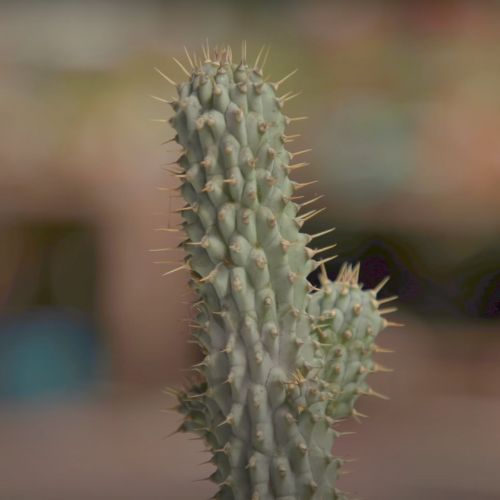When was the last time you heard about hoodia gordonii? Few people have – perhaps with the exception of the inhabitants of southern Africa. Yet, over the last two decades, this plant’s fame as a weight loss booster has spread far beyond its home base.
In a world overflowing with supposedly magical solutions for weight loss, popularity does not necessarily translate to efficacy. That’s why I want to take you through everything you need to know about hoodia gordonii including whether the science on its weight loss abilities checks out.
Key Points
What is Hoodia Gordonii?
Hoodia Gordonii is a cactus-like plant that typically grows in arid regions like the Kalahari Desert. It has a succulent, thick, cylindrical stem and fleshy leaves. The San people of southern Africa have for centuries used hoodia to suppress appetite and reduce hunger. They would chew on the plant's roots or leaves before going on a long hunt or journey. Hoodia was also used to treat thirst and dehydration.

In the late 1990s and early 2000s, hoodia was gradually introduced to the Western world as a weight loss supplement. The plant contains various compounds, but the most notable one is P57, which is thought to be the source of its appetite-suppressing effects. P57 is believed to bind to receptors in the brain that control hunger. By doing so, it sends a signal to the brain that the body is satiated, even if it is not.
Research on Hoodia Gordonii and Weight Loss
While the traditional use of hoodia gordonii as an appetite suppressant among the San is well-documented, scientific studies on its weight loss efficacy are limited. Much of the research is based on animal experiments.
For example, in a 2012 study published in the Journal of Ethnopharmacology, 12 obese and 12 lean Wistar rats were placed on a placebo or hoodia gordonii extract for 14 days. All rats on hoodia supplementation experienced weight loss, an effect that researchers attributed to reduced fat and muscle mass.
Amidst the news of hoodia’s efficacy this animal study conveys, I’d say the reduction in muscle mass is a bit concerning and certainly not a result the average overweight person should want.
Human studies remain extremely rare. There is currently just one clinical trial that involves human subjects. It was published in the American Journal of Clinical Nutrition in 2011. 49 overweight healthy women were placed on either a placebo or 1,110mg of hoodia gordonii extract per day for 15 days.
There were no differences in weight loss or metabolism between the two groups – a finding that dealt a blow to hoodia gordonii’s reputation as an appetite suppressant. But that was not all. The study found that the hoodia group experienced adverse changes in vital signs such as blood pressure, heart rate and pulse.

In other words, not only did hoodia do nothing for weight loss, it also had a negative effect on subjects’ health. They were better off not taking it at all!
Overall, based on existing research, I rate hoodia’s abilities as an appetite suppressant or weight loss supplement is weak. Actually, a 2014 literature review argued that even where hoodia does seem to have a positive effect on weight loss and appetite suppression, this could ironically be partially attributed to its adverse effects.
Safety
Side effects are perhaps a bigger story on hoodia supplementation than whether or not it helps weight loss. Hoodia use may be accompanied by nausea, constipation, dizziness and unusual skin sensation. Studies also found it could cause negative changes to blood pressure and heart function.
There is currently no recommended dosage for hoodia. What we do know from the little research done in humans is that anything in excess of 1,100 mg is much more than your body needs. Many supplements that include hoodia have it in the 200 to 500 mg range per day.
Verdict
While hoodia gordonii has gained popularity as a potential weight loss aid due to its long use as an appetite suppressant in southern Africa, evidence of its efficacy is weak. Studies involving human subjects are near non-existent. And in animal studies that indicate hoodia might work, there are worrying findings such as muscle loss.
So what can we say? If you are looking for a herbal supplement that will really complement the lifestyle efforts you put into your weight loss journey, hoodia gordonii is not it.
Related Articles:

